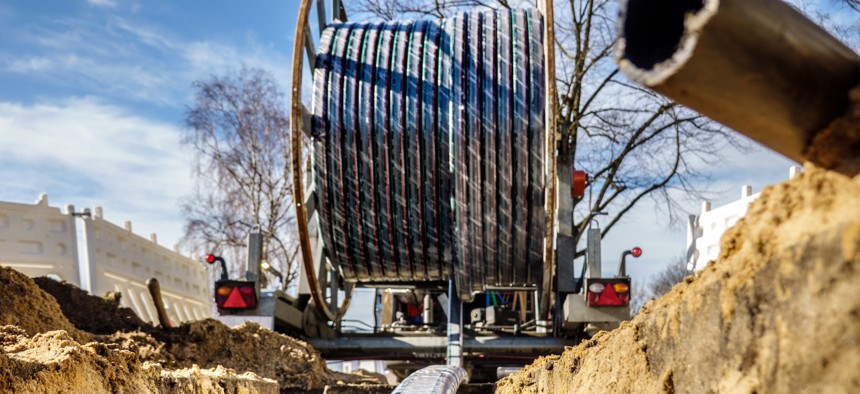Biden signs law easing rural broadband projects

deepblue4you via Getty Images
The E-BRIDGE Act, included in a sweeping water infrastructure package, makes those projects eligible for certain federal grants and allows recipients to use private sector expertise in their development and deployment.
Just days before the end of his term, President Joe Biden signed into law an effort to make it easier to deploy broadband infrastructure in rural areas.
Biden signed the Eliminating Barriers to Rural Internet Development Grant Eligibility Act, known as the E-BRIDGE Act, as part of the sweeping biannual Water Resources Development Act that deals with various aspects of water resources and projects but has other bills added to it.
The legislation makes broadband projects in distressed communities eligible for grants from the Economic Development Authority by eliminating barriers to investment in last-mile projects, which connect to homes and other buildings. It clarifies that eligible grant recipients can use public-private partnerships and other consortia to make use of private sector expertise in developing and deploying their projects.
The law also provides more flexibility in the procurement process to reflect the sometimes-limited broadband options in distressed and rural communities, clarifies that funds can be combined with other federal resources and adds flexibility in accounting for in-kind payments to meet non-federal cost sharing requirements.
“Unfortunately, too many of our communities, particularly in rural America, still lack broadband access,” Rep. Sam Graves, the Missouri Republican who chairs the House Transportation and Infrastructure Committee, said in a statement. “In some cases, just completing that ‘last mile’ is what stands in the way of connecting people to a job they need. The E-BRIDGE Act will help spur projects that attract jobs and businesses to expand economic development and opportunity in rural and poor communities.”
The E-BRIDGE Act has long been a priority for the House. It has passed the chamber on several occasions, and this time around received approval from the transportation committee in July 2023. It then passed the full House again almost a year later.
Elected officials hope it will help attract new and support current businesses in distressed regions of the country, to help lay the groundwork for economic recovery in those areas and better prepare them for future disasters or epidemics.
While the prospect of federal investment in rural broadband — either through the $42 billion Broadband Equity, Access, and Deployment Program or the myriad other grant programs — is enticing, it can be difficult to make those projects work financially. Companies are reluctant to lay fiber in rural areas as the customer base would not provide a large enough return on their investment, so many places are left behind while more densely populated areas receive better infrastructure.
In their stead, electric co-operatives have been among those to step up to provide service, similar to the 1930s when they provided electricity service in parts of the country that had been left behind by the big players.
Broadband’s benefits can be tremendous for rural communities. A report last year from the Center on Rural Innovation found that businesses grew more than 200% in rural areas with high broadband utilization rates. Meanwhile, NTCA-The Rural Broadband Association said last year creating a digital equity plan, building partnerships and engaging in community outreach are just some of the ways rural communities can reduce the digital divide.
While BEAD has at times proven politically controversial and could be subject to changes from President-elect Donald Trump and his incoming administration, House leaders said legislation like the E-BRIDGE Act could be a perfect way to get projects off the ground, especially in rural and distressed areas.
“For America to thrive, people in rural America must thrive,” Rep. Tracey Mann, a Kansas Republican, said in a statement when the E-BRIDGE Act was introduced in 2023. “We all rely on high-speed broadband for both our personal and professional lives, and communities making investments in their own rural broadband access shouldn’t have to deal with mountains of red tape while they do it."






